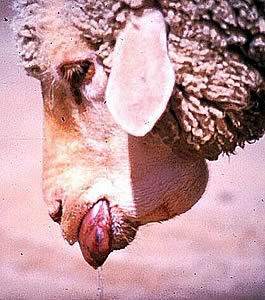By Libuseng Molato
300 sheep across the country have died following the outbreak of Blue Tongue.
The Ministry of Agriculture Food Security and Nutrition, in collaboration with the Department of Livestock, has issued a concerning report of a countrywide outbreak of the blue tongue pandemic afflicting livestock across Lesotho, with sheep bearing the brunt of its impact.
Dr. Seeiso Tabitha Masentle, Director of Veterinary Public Health and Food Safety, when speaking to Seahlolo shed light on the origins of the blue tongue pandemic, attributing its spread to mosquitoes, particularly prevalent in wetlands.
“As animals traverse wetlands and valleys, they become susceptible to mosquito bites, leading to the transmission of the disease,” Dr. Seeiso elucidated.
The pandemic has ravaged nearly 1882 livestock, with a tragic toll of 300 fatalities reported.
In response to this crisis, the Department of Livestock has embarked on a comprehensive operation to combat the pandemic, including widespread vaccination campaigns and on-the-ground assistance for affected farmers.
Dr. Seeiso emphasised the importance of proactive measures, urging farmers to vaccinate their livestock ahead of the impending winter season when the disease is expected to escalate.
Mamoholi Mphutlane, Information Officer at the Department of Livestock Services, highlighted the regional disparities in reported cases, with lowland areas bearing the brunt of the pandemic’s impact due to higher temperatures conducive to mosquito breeding.
Lebohang Mosaola, Agribusiness Development Specialist and founder of Leseli La Lihoai, underscored the severity of the disease, particularly in sheep, where symptoms manifest most acutely.
Mosaola elucidated, “Bluetongue strikes throughout summer, with mosquitoes serving as key vectors for transmission.”
“The severity of the disease varies among different species with symptoms being most severe in sheep resulting in deaths, weight loss and disruption in wool growth. In highly susceptible sheep, morbidity can be as high as a hundred per cent,” Mosaola said.
Daniel Chakela, vise president of Lesotho National Farmers Union and a farmer expressed the profound impact of the pandemic on farmers, stressing the ripple effects on the country’s economy and the Wool and Mohair industry.
“Once animals start dying, that symbolises an immediate economic challenge and a dent on the wool and mohair sector,” Chakela said.
In response to the crisis, Minister of Agriculture Food Security and Nutrition Thabo Mofosi unveiled a series of control measures in Parliament.
These measures include mandatory immunisation for sheep, strategic relocation of livestock from valleys to higher elevations, and strict protocols for vaccination timing, particularly for pregnant ewes.
Mofosi reiterated the importance of consultation with veterinarians and adherence to vaccination schedules, cautioning against immunisation during outbreaks and emphasising the need for sterile needle use to prevent disease transmission.
As Lesotho grapples with the blue tongue pandemic, unity, vigilance, and swift action are imperative, the minister urged citing that through collaborative efforts between government agencies, farmers, and stakeholders, the nation can mitigate the impact of this crisis and safeguard the livelihoods of its farmers and the welfare of its livestock




